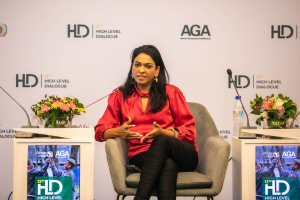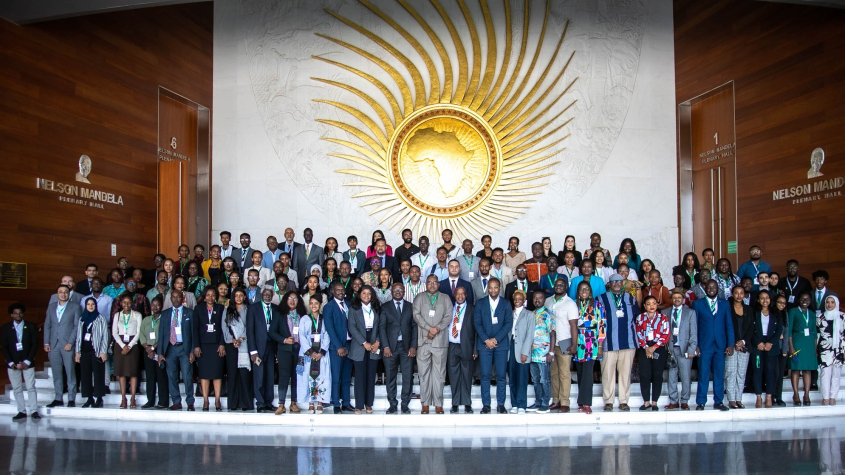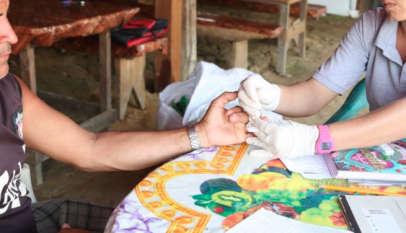BLOG | From Borders to Bridges: The Quest for a Borderless Africa
In this edition of her fortnightly blog, Yavi Madurai reflects on discussions at the recently held African Union’s 12th High-Level Dialogue on Democracy, Human Rights and Governance, particularly in relation to the nexus between the AfCFTA and the AU-FMP and the overall quest for a borderless Africa.

The idea of a borderless Africa scares some people.
Fact!
For the reasons we know, for the reasons we think we know, and for the reasons we may not even understand.
Regardless of our individual stance on this issue – what matters most is that we need to continuously explore HOW to resolve this issue and dispel the fears of those against the idea of a borderless continent.
The African Union’s 12th High-Level Dialogue on Democracy, Human Rights and Governance was held last week at the AU Commission in Addis Ababa. The dialogue centered around the AU’s theme for 2023: “Accelerating the Implementation of the African Continental Free Trade Area (AfCFTA)”, which was preceded by two pre-events on youth and gender, respectively.
The 4-day dialogue featured reflective insights from some of the biggest names in African governance, peace and security as well as the AfCFTA. And, of course, the Free Movement Protocol (FMP). This esteemed line-up of speakers included H.E. Hailemariam Desalegn, former Prime Minister of Ethiopia; H.E. Amb. Bankole Adeoye, the African Union Commissioner for Political Affairs, Peace and Security; Ms. Chido Cleopatra Mpemba, current AU Youth Envoy.
Being a vocal and passionate advocate of the AfCFTA and the FMP, yours sincerely was privileged to serve as a moderator and speaker in the weeklong discussions.
It was Dr Fonteh Akum, the Executive Director of the Institute for Security Studies (ISS), who put a spin on the ‘Bridges instead of Borders’ narrative, giving me something profoundly contemplative to walk away with. He proffered that as much as we need to create bridges between physical borders, we also need to build bridges between organs, agencies and departments within the AU, like between the Department of Political Affairs and Peace and Security and the Department of Economic Development, Trade, Tourism Industry and Mining; between the Department of Infrastructure and Energy and the AfCFTA Secretariat.
My major takeaway from his submission is that we need mindset change in Africa: we need to build bridges among ourselves and enhance our ‘connectivity’, rather than perpetuating borders, which are barriers that continue to divide us and entrench our’separation’. So, while African integration has long been touted as the catalyst for our collective prosperity through the ambitious Agenda 2063, this grand vision can only be achieved via a borderless Africa.
This perspective was best captured by Jennifer Ogbogu of the AU’s Committee of Intelligence and Security Services (CISSA). Jennifer argued that our obsession with entrenching borders does not guarantee us security from cybercrimes and cyberterrorism, which transcend physical borders. In this vein, Jennifer called for an integrated and centralized security mechanism that allows for communication, information, and intelligence sharing between border security officials.
Another speaker at the dialogue, Rita Amukhobu, the Head of the Humanitarian Affairs Division at the AU Commission where the FMP and Migration Policy Framework for Africa (MPFA) portfolio resides, emphasized the AfCFTA-FMP nexus, noting that “the centrality of people in the AfCFTA must not be ignored”. This affirmed my belief in the AfCFTA-FMP connection and the two policies being the ultimate pathways for Africa’s economic freedom. This belief is premised on the historical case study of the European Union’s formation in the 1960-1969 decade, also known as the “Swinging Sixties”. It was the decade of the creation of European free trade and free movement, which are the basis of Europe’s economic prosperity and infrastructure development. This principle was enshrined in the 1957 Treaty of Rome, also referred to as the “Four Fundamental Freedoms”, i.e., the free movement of goods, services, capital and people.
I have keen interest in the ‘Four Fundamental Freedoms’ specifically for their potential to create wealth and economic prosperity. It is therefore ironic that whilst they were busy creating a borderless Europe at home, European countries were also busy partitioning Africa and erecting borders among people who have lived side by side of hundreds of years, in the name of colonisation. The sad reality is that this borders still remain in place decades after colonisation.
On numerous occasions, the European Parliament had been presented with a bill for the separation of the Four-Freedoms being – and every single time, it had unanimously opted for continued European integration. The UK’s ‘Brexit’ was the result of one of these efforts to end European integration. We are already seeing its impact on the UK’s economy. It is undeniable that the UK’s development trajectory has not only slowed down but is “at a standstill.” According to the Economist, “Britain’s economy has gone from a leader to a laggard internationally, as GDP growth has slowed sharply.”
While Africa and the EU are fundamentally different, the EU’s case study of economic integration cannot and must not be ignored. Africa must learn from Europe’s trajectory as far as integration is concerned and not make the same mistakes as they did or new mistakes in the face of proven evidence and statistically valid facts that provide insights into what has worked and what has not.
My most significant takeaway from the High-Level Dialogue was the recommendation for the appointment of a Special Envoy for the Free Movement Protocol (FMP) to take charge of the advocacy for its implementation. I believe this is long overdue, and I hope the AU acts on this crucial recommendation as quickly as possible. My thought is that the AU should appoint a head of state to champion the implementation of the Protocol. Yet, having a special envoy is not a bad idea either!













